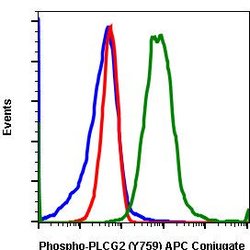Learn More
Invitrogen™ Phospho-PLCg2 (Tyr759) Recombinant Rabbit Monoclonal Antibody (PLCG2Y759-G3), APC
Rabbit Recombinant Monoclonal Antibody
Supplier: Invitrogen™ MA528031
Description
Recombinant rabbit monoclonal antibodies are produced using in vitro expression systems. The expression systems are developed by cloning in the specific antibody DNA sequences from immunoreactive rabbits. Then, individual clones are screened to select the best candidates for production. The advantages of using recombinant rabbit monoclonal antibodies include: better specificity and sensitivity, lot-to-lot consistency, animal origin-free formulations, and broader immunoreactivity to diverse targets due to larger rabbit immune repertoire.
Phosphoinositide-specific phospholipase C (PLC) plays a crucial role in the initiation of receptor mediated signal transduction through the generation of the two second messengers, inositol 1,4,5-triphosphate and diacylglycerol from phosphatidylinositol 4,5-bisphosphate. There are many mammalian PLC isozymes, including PLC beta1, PLC beta2, PLC beta3, PLC beta4, PLC gamma1, PLC gamma2, PLC delta1, PLC delta2 and PLCe. PLC delta exists as four different isoforms. PLC delta1, a calcium signal amplifier, is activated by an atypical GTP-binding protein. In addition, PLC delta1 is an effector for GTP-binding protein transglutaminase II-mediated oxytocin receptor and alpha1B-adrenoreceptor signaling. Mouse PLC delta1 is highly expressed in brain, heart, lung and testis. PLC delta is abnormally accumulated in autopsied brains with Alzheimer's disease (AD), suggesting that it may play a role in the pathology of AD. PLC delta2 is markedly expressed in type II intestinal metaplasia and in the adenocarcinoma. When PLC delta2 is expressed in type I intestinal metaplasia, the metaplasia is generally considered benignant, yet evolves toward neoplastic transformation. Thus, PLC delta2 expression may be a possible marker of gastric malignant transformation.
Specifications
| Phospho-PLCg2 (Tyr759) | |
| Recombinant Monoclonal | |
| APC | |
| Plcg2 | |
| 1-phosphatidylinositol 4,5-bisphosphate phosphodiesterase gamma-2; 1-phosphatidylinositol-4,5-bisphosphate phosphodiesterase gamma-2; APLAID; FCAS3; phosphoinositide phospholipase C; phosphoinositide phospholipase C-gamma-2; phospholipase C gamma 2; phospholipase C, gamma 2; phospholipase C, gamma 2 (phosphatidylinositol-specific); phospholipase C-gamma-2; Phospholipase C-IV; PLC gamma 2; PLC gamma2; PLC- gamma2; PLC gamma-2; PLCG2; Plcg-2; PLC-gamma; PLCgamma2; PLC-gamma-2; PLC-IV | |
| Rabbit | |
| Protein A/G | |
| RUO | |
| 234779, 5336 | |
| 4°C | |
| Liquid |
| Flow Cytometry | |
| PLCG2Y759-G3 | |
| PBS with 0.2% BSA and 0.09% sodium azide; pH 7.4 | |
| P16885, Q8CIH5 | |
| Plcg2 | |
| A synthetic phospho-peptide corresponding to residues surrounding Tyr759 of human phospho PLCgamma2. | |
| 100 Tests | |
| Primary | |
| Human, Mouse | |
| Antibody | |
| IgG κ |
Your input is important to us. Please complete this form to provide feedback related to the content on this product.
